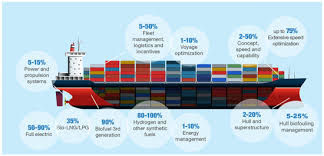Training course on LNG Shipping Economics and Freight Cost Calculations
Training Course on LNG Shipping Economics & Freight Cost Calculations emphasizes practical applications, enabling participants to analyze the financial implications of LNG shipping and develop strategies to optimize freight costs.

Course Overview
Training Course on LNG Shipping Economics & Freight Cost Calculations
Introduction
The LNG Shipping Economics & Freight Cost Calculations course is designed for professionals in the energy and shipping industries who seek to understand the complex dynamics of liquefied natural gas (LNG) transportation. As the demand for LNG continues to rise globally, mastering the economic principles and cost calculations associated with LNG shipping becomes essential for making informed decisions in this competitive market. Training Course on LNG Shipping Economics & Freight Cost Calculations emphasizes practical applications, enabling participants to analyze the financial implications of LNG shipping and develop strategies to optimize freight costs.
In an era where energy security and sustainability are paramount, understanding LNG shipping economics is crucial for stakeholders involved in the LNG supply chain. Participants will engage in hands-on activities that highlight the factors influencing freight rates, such as vessel chartering, operational costs, and market trends. By incorporating real-world case studies and simulations, this course empowers attendees to make data-driven decisions that enhance profitability and operational efficiency in LNG transport. By the end of the program, participants will be well-equipped to navigate the complexities of LNG shipping economics and contribute effectively to their organizations.
Course Objectives
- Understand the fundamentals of LNG shipping and its economic implications.
- Master the principles of freight cost calculations in LNG transport.
- Analyze the factors affecting LNG shipping rates and market dynamics.
- Evaluate the impact of global energy markets on LNG pricing.
- Develop strategies for optimizing shipping logistics and costs.
- Assess the operational aspects of LNG vessel management.
- Utilize financial modeling techniques for LNG shipping scenarios.
- Examine regulatory and environmental considerations in LNG transport.
- Communicate effectively with stakeholders regarding shipping economics.
- Conduct risk assessments related to LNG shipping operations.
- Explore innovations in LNG shipping and technology advancements.
- Prepare for future trends in the LNG market and shipping industry.
- Analyze real-world case studies to apply theoretical concepts.
Target Audience
- LNG Traders
- Shipping Analysts
- Energy Economists
- Logistics Coordinators
- Maritime Operations Managers
- Financial Analysts in Energy Sector
- Regulatory Affairs Specialists
- Graduate Students in Energy Management
Course Duration: 5 Days
Course Modules
Module 1: Introduction to LNG Shipping
- Overview of the LNG supply chain.
- Importance of LNG in the global energy market.
- Key players in LNG shipping economics.
- Basic terminology and definitions in LNG transport.
- Case studies on LNG market developments.
Module 2: Freight Cost Calculations
- Fundamentals of freight cost components.
- Fixed vs. variable costs in LNG shipping.
- Calculating charter rates and operating expenses.
- Understanding the role of freight forwarders.
- Real-world examples of cost calculations.
Module 3: Market Dynamics and Pricing
- Factors influencing LNG pricing and demand.
- Analyzing supply and demand dynamics.
- The impact of geopolitical factors on LNG markets.
- Understanding spot vs. long-term contracts.
- Case studies on pricing strategies.
Module 4: Shipping Logistics and Optimization
- Best practices for LNG shipping logistics.
- Route planning and scheduling considerations.
- Strategies for optimizing fleet operations.
- Managing shipping contracts and negotiations.
- Tools for logistics management in LNG transport.
Module 5: Operational Aspects of LNG Vessels
- Types of LNG carriers and their specifications.
- Operational efficiency of LNG vessels.
- Maintenance and safety standards in LNG shipping.
- Crew management and training requirements.
- Case studies on vessel performance.
Module 6: Financial Modeling in LNG Shipping
- Introduction to financial modeling techniques.
- Building financial models for LNG projects.
- Evaluating economic feasibility and profitability.
- Sensitivity analysis and risk assessment.
- Applications of financial models in decision-making.
Module 7: Regulatory and Environmental Considerations
- Overview of regulations affecting LNG shipping.
- Environmental impacts of LNG transport.
- Compliance with international shipping standards.
- Understanding emissions regulations and sustainability.
- Case studies on regulatory challenges.
Module 8: Stakeholder Communication and Engagement
- Importance of effective communication in LNG shipping.
- Engaging stakeholders across the supply chain.
- Presenting financial and operational data clearly.
- Building relationships with regulatory bodies.
- Strategies for stakeholder management.
Training Methodology
- Interactive Workshops: Facilitated discussions, group exercises, and problem-solving activities.
- Case Studies: Real-world examples to illustrate successful community-based surveillance practices.
- Role-Playing and Simulations: Practice engaging communities in surveillance activities.
- Expert Presentations: Insights from experienced public health professionals and community leaders.
- Group Projects: Collaborative development of community surveillance plans.
- Action Planning: Development of personalized action plans for implementing community-based surveillance.
- Digital Tools and Resources: Utilization of online platforms for collaboration and learning.
- Peer-to-Peer Learning: Sharing experiences and insights on community engagement.
- Post-Training Support: Access to online forums, mentorship, and continued learning resources.
Register as a group from 3 participants for a Discount
Send us an email: info@datastatresearch.org or call +254724527104
Certification
Upon successful completion of this training, participants will be issued with a globally recognized certificate.
Tailor-Made Course
We also offer tailor-made courses based on your needs.
Key Notes
- Participants must be conversant in English.
- Upon completion of training, participants will receive an Authorized Training Certificate.
- The course duration is flexible and can be modified to fit any number of days.
- Course fee includes facilitation, training materials, 2 coffee breaks, buffet lunch, and a Certificate upon successful completion.
- One-year post-training support, consultation, and coaching provided after the course.
- Payment should be made at least a week before the training commencement to DATASTAT CONSULTANCY LTD account, as indicated in the invoice, to enable better preparation.